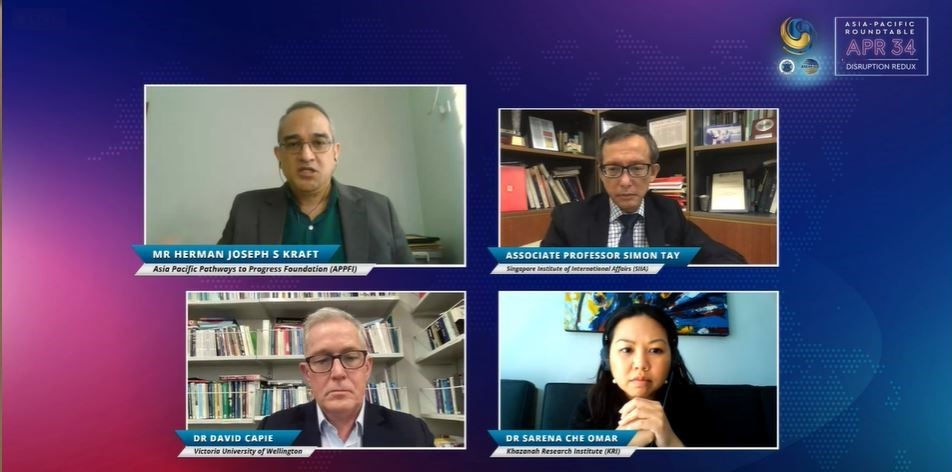With Indonesia as the current epicentre of the COVID-19 outbreak, the current humanitarian crisis in Myanmar and political instability in Malaysia, the prospect of the region’s previously forecasted quick recovery seems unlikely.
From 17 August to 18 August 2021, the Institute of Strategic and International Studies (ISIS) Malaysia hosted the 34th Asia-Pacific Roundtable. The conference was themed, “Disruption Redux”, where discussions centered around the disruptive impact the COVID-19 pandemic had on different areas and fields, as well as the pandemic’s possible long-term effects.
The second panel of the conference was titled, “The Social and Political Costs of the Pandemic in Southeast Asia”. Speakers discussed the extensive impacts of border closures brought about by the outbreak of COVID-19. As a result of the lockdowns, ASEAN’s interdependence was challenged — including labour and supply chains, services, and capital as well as human mobility. The panellists also shed some light on the region’s recovery with vaccinations picking up. Speakers included Associate Professor Simon Tay, Chairman of the SIIA, Dr David Capie, Director of the Centre for Strategic Studies and Dr Sarena Che Omar, Deputy Director of Research of the Khazanah Research Institute. The session was moderated by Mr Herman Joseph S Kraft.
Current geopolitical situation
Southeast Asia was previously on track for a quick economic recovery from COVID-19 but the delta variant has ravaged the region and drastically changed the situation. Vaccines are crucial for the situation to turn around. However, with the exception of Singapore and Cambodia, the region is doing poorly in terms of vaccination rates due to the lack of supply. With limited vaccine doses, the region has seen increasing strategic competition between the US and China, with China utilising vaccine diplomacy and the US following suit. The economic impact has also been severe. According to the International Labour Organisation, in 2020, there were 10 million fewer workers in employment than forecasted for 2020 in a no-pandemic scenario. The mass unemployment has also resulted in food insecurity amongst the most vulnerable. While some countries remain politically stable, others are currently in the midst of political uncertainty and crisis. Most notably, Myanmar is currently the worst hit by COVID-19 due to its crumbling health infrastructure since the coup in February, turning the political crisis into a humanitarian one. Speakers also highlighted the social implications of pandemic, mainly its negative impact on the mental health of people.
Need for ASEAN unity and cooperation
As circumstances in Myanmar deteriorate, Professor Tay, highlighted the urgent need to resolve the crisis in Myanmar is also an opportunity for ASEAN unity and cooperation. As individual countries recover, intra-ASEAN assistance and cooperation must step up. Further collaboration would ease the problem of too much vaccine diplomacy and over-reliance on vaccines from the US or China. This could also help prevent ASEAN centrality from being strained.
With each crisis and challenge that ASEAN faces, there are also opportunities that it can seize. Yet, we must also acknowledge the limits of ASEAN, given that much of the geopolitical issues they face are largely out of its control. As the Delta variant continues to ravage Southeast Asia, countries are preoccupied with dealing with the spikes in COVID-19 case numbers. However, as vaccination rates pick up and the region recovers, ASEAN should further integrate and draw strength from each other to deal with future challenges.




